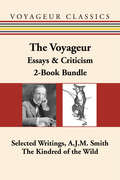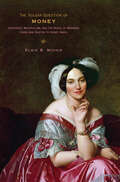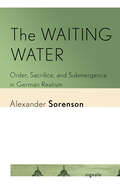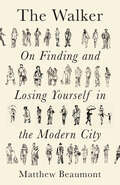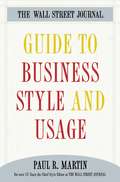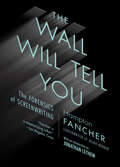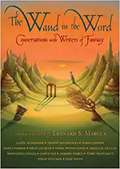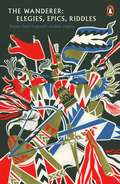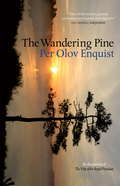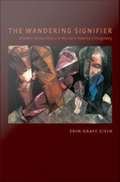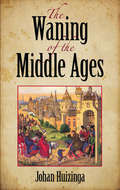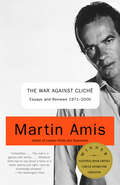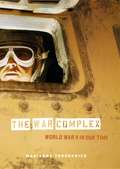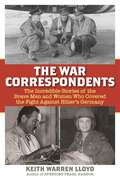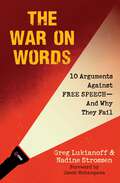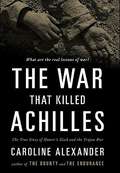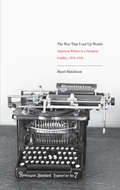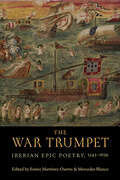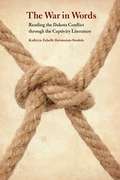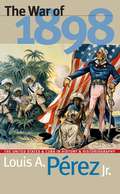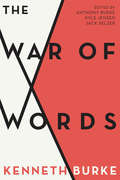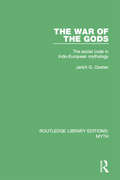- Table View
- List View
The Voyageur Canadian Essays & Criticism 2-Book Bundle: Selected Writings, A.J.M. Smith / The Kindred of the Wild
by Michael Gnarowski Charles G. Roberts James Polk A.J.M. SmithVoyageur Classics is a series of new versions of Canadian classics, with added material and special introductions. In this bundle we find two classic works of the art of the Canadian essay. Charles G.D. Roberts was a distinguished writer of his time who published more than forty volumes of poetry, romance fiction, and nature writing – making him one of the most popular writers of his time. He pioneered the animal story in which he went beyond surface elements of nature and endowed his animal "characters" with qualities of feeling and intelligence that brought them closer to their human cousins. Roberts’ career as a writer transcended his Canadian roots and he was internationally known and popular in America and England. Arthur James Marshall Smith – prize-winning poet, essayist, influential anthologist, and critic – died in 1980. His last book, The Classic Shade: Selected Poems, on which Selected Writings is based, stands as his final intention in the world of literature. To this long out of print book the editor has added original material by Smith in which he defined and advanced modernism in Canadian writing. Includes Selected Writings, A.J.M. Smith The Kindred of the Wild
The Vulgar Question of Money: Heiresses, Materialism, and the Novel of Manners from Jane Austen to Henry James
by Elsie B. MichieIt is a familiar story line in nineteenth-century English novels: a hero must choose between money and love, between the wealthy, materialistic, status-conscious woman who could enhance his social position and the poorer, altruistic, independent-minded woman whom he loves. Elsie B. Michie explains what this common marriage plot reveals about changing reactions to money in British culture.It was in the novel that writers found space to articulate the anxieties surrounding money that developed along with the rise of capitalism in nineteenth-century England. Michie focuses in particular on the character of the wealthy heiress and how she, unlike her male counterpart, represents the tensions in British society between the desire for wealth and advancement and the fear that economic development would blur the traditional boundaries of social classes.Michie explores how novelists of the period captured with particular vividness England’s ambivalent emotional responses to its own financial successes and engaged questions identical to those raised by political economists and moral philosophers. Each chapter reads a novelist alongside a contemporary thinker, tracing the development of capitalism in Britain: Jane Austen and Adam Smith and the rise of commercial society, Frances Trollope and Thomas Robert Malthus and industrialism, Anthony Trollope and Walter Bagehot and the political influence of money, Margaret Oliphant and John Stuart Mill and professionalism and managerial capitalism, and Henry James and Georg Simmel and the shift of economic dominance from England to America.Even the great romantic novels of the nineteenth century cannot disentangle themselves from the vulgar question of money. Michie’s fresh reading of the marriage plot, and the choice between two women at its heart, shows it to be as much about politics and economics as it is about personal choice.
The Waiting Water: Order, Sacrifice, and Submergence in German Realism (Signale: Modern German Letters, Cultures, and Thought)
by Alexander SorensonThe Waiting Water addresses one of the most recurrent and troubling motifs in German Realist literature—death by drowning. Characters find themselves before bodies of water, presented with the familiar realm above the surface and the unobservable, uncanny domain beneath it. With somber regularity, they then disappear into the depths. Alexander Sorenson explores the role that these hidden deaths in water play within a literary movement that set out precisely to reveal universal truths about human life. The poetics of submergence, he argues, revolve around two concepts fundamental to Poetic Realism—order and sacrifice.Focusing on texts by Adalbert Stifter, Gottfried Keller, Marie von Ebner-Eschenbach, and Theodor Storm, along with material from earlier and later epochs, The Waiting Water shows that the pervasive symbolism of drowning scenes in German Realism, which typically occur in zones of narrative invisibility on the social periphery, reveals the extent to which realist narrative uses the natural environment to work through deeply embedded and hidden tensions that troubled the social and moral life of the age.
The Walker: On Losing and Finding Yourself in the Modern City
by Matthew BeaumontA literary history of walking From Dickens to ZizekThere is no such thing as the wrong step; every time we walk we are going somewhere. Moving around the modern city becomes more than from getting from A to B, but a way of understanding who and where you are. In a series of riveting intellectual rambles, Matthew Beaumont, retraces a history of the walker.From Charles Dicken's insomniac night rambles to wandering through the faceless, windswept monuments of the neoliberal city, the act of walking is one of escape, self-discovery, disappearances and potential revolution. Pacing stride for stride alongside such literary amblers and thinkers as Edgar Allen Poe, Andrew Breton, H G Wells, Virginia Woolf, Jean Rhys and Ray Bradbury, Matthew Beaumont explores the relationship between the metropolis and its pedestrian life. He asks can you get lost in a crowd? It is polite to stare at people walking past on the street? What differentiates the city of daylight and the nocturnal metropolis? What connects walking, philosophy and the big toe? Can we save the city - or ourselves - by taking the pavement?
The Wall Street Journal Guide to Business Style and Us
by Paul MartinHere at last is the indispensable resource that has helped the writers and editors of The Wall Street Journal earn a reputation for the most authoritative business writing anywhere. Originally written exclusively for the paper's staff, The Wall Street Journal Guide to Business Style and Usage is a landmark work. Many years in preparation, it has now been expanded and revised for anyone who wants to write well, but especially for those in the business community. The only book of its kind, it offers A-Z guidance on style and usage, bearing in mind the special needs of business professionals and including the latest business terminology. If ABC is no longer the American Broadcasting Company, what is it? What is the difference bet-ween "adjusted gross receipts" and "adjusted gross income"? How about the differences among "adopt," "approve," "enact" and "pass"? When should you say "affect" and when "effect"? When did Generation X end and Generation Y begin? And what the heck is the new name of Andersen Consulting? Our language is ever changing, ever mutating, and the choice of the right word bolsters your credibility with readers. As the go-to resource for these questions and others, The Wall Street Journal Guide to Business Style and Usage gives readers a competitive edge for succeeding in the world of business. It is an invaluable resource for any member of the business community who has ever had to write a memo, report, proposal, press release or e-mail. Destined to be the standard resource for years to come, The Wall Street Journal Guide to Business Style and Usage provides readers with access to the Journal Web site (www.wsjbooks.com), which will feature updates as new business terms enter the language or as old definitions or usages give way to new. This guide is the definitive reference work to keep close to your desk -- the last word for everyone who works with words.
The Wall Will Tell You: The Forensics of Screenwriting
by Hampton FancherA completely original guide to the screenwriter's art -- as only the writer of Blade Runner could concieve it.The master speaks, in this unique guide for screenwriters -- and writers and artists of all kinds. In short paragraphs--oracular and enigmatic, hardhitting and concrete--the man Forbes called a "creative genius" writes a guide book like none other for the aspiring screenwriter. Learn how to write living, breathing characters, exciting action and plot, and develop your own artistic vision. And learn how to never compromise that vision, most importantly, with yourself.
The Wand in the Word: Conversations with Writers of Fantasy
by Leonard S. MarcusIn a series of incisive interviews, Leonard S. Marcus engages thirteen master storytellers in spirited conversation about their life and work, providing inspiring reading for fantasy fans and future writers alike. What kind of child were you? When did you decide you wanted to be a writer? Why do you write fantasy? "Fantasy," writes Leonard S. Marcus, "is storytelling with the beguiling power to transform the impossible into the imaginable and to reveal our own 'real' world in a fresh and truth-bearing light." Few have harnessed this power with the artistry, verve, and imagination of the authors encountered in this compelling book. How do they work their magic? Finely nuanced and continually revealing, Leonard S. Marcus's interviews range widely over questions of literary craft and moral vision, as he asks thirteen noted fantasy authors about their pivotal life experiences, their literary influences and work routines, and their core beliefs about the place of fantasy in literature and in our lives.
The Wanderer: Elegies, Epics, Riddles (Legends from the Ancient North)
by Petra BornerPart of a new series Legends from the Ancient North, The Wanderer tells the classic tales that influenced JRR Tolkien's The Hobbit and The Lord of the Rings'So the company of men led a careless life,All was well with them: until One beganTo encompass evil, an enemy from hell.Grendel they called this cruel spirit...'J.R.R. Tolkien spent much of his life studying, translating and teaching the great epic stories of northern Europe, filled with heroes, dragons, trolls, dwarves and magic. He was hugely influential for his advocacy of Beowulf as a great work of literature and, even if he had never written The Hobbit and The Lord of the Rings, would be recognised today as a significant figure in the rediscovery of these extraordinary tales.Legends from the Ancient North brings together from Penguin Classics five of the key works behind Tolkien's fiction.They are startling, brutal, strange pieces of writing, with an elemental power brilliantly preserved in these translations.They plunge the reader into a world of treachery, quests, chivalry, trials of strength.They are the most ancient narratives that exist from northern Europe and bring us as near as we will ever get to the origins of the magical landscape of Middle-earth (Midgard) which Tolkien remade in the 20th century.
The Wandering Pine: Life as a Novel
by Per Olov EnquistWhen everything began so well, how could it turn out so badly? A blisteringly frank autobiographical novel by Sweden's great man of letters - for readers of K. O. Knausgaard's My Struggle."Some life. Some novel . . . Wonderful, brave, evocative . . . It is a remarkable story, and Enquist is remarkably frank in narrating every last detail" HeraldWhat was it about Hjoggböle, a farming village in the northernmost part of Sweden, that created so many idiots - and writers? There was nothing to indicate that P.O. Enquist would be stricken by an addiction to writing. Nothing in his family - honest, hardworking people. Not a trace of poetry. And yet he worked his way, via journalism, novels and plays, to the centre of Swedish politics and cultural life. His books garnered prize after prize. His plays ran for decades and premiered on Broadway. Why then, living with a new wife in Paris, does he hole up in their palatial Champes-Élysées apartment, talking only to his cat? How is it that he wakes to find himself in an uncoupled carriage on a railway siding in Hamburg, two - or was it three? - days after the first-night party finished? And what is it that drives him to run shoeless through the deep January snow of an Icelandic plain, leaving the lights of the drying out clinic far behind? Narrating in the third person, as if he were merely a character in the eventful, perplexing and ultimately triumphantly redemptive drama of his own life, P.O. Enquist is as elliptical as Karl Ove Knausgaard is exhaustive. Clear-eyed, rueful, written with elegance and humour, this is the singular story of a remarkable man.
The Wandering Signifier: Rhetoric of Jewishness in the Latin American Imaginary
by Erin Graff ZivinWhile Jews figure in the work of many modern Latin American writers, the questions of how and to what end they are represented have received remarkably little critical attention. Helping to correct this imbalance, Erin Graff Zivin traces the symbolic presence of Jews and Jewishness in late-nineteenth- through late-twentieth-century literary works from Argentina, Brazil, Peru, Mexico, Colombia, and Nicaragua. Ultimately, Graff Zivin's investigation of representations of Jewishness reveals a broader, more complex anxiety surrounding difference in modern Latin American culture. In her readings of Spanish American and Brazilian fiction, Graff Zivin highlights inventions of Jewishness in which the concept is constructed as a rhetorical device. She argues that Jewishness functions as a wandering signifier that while not wholly empty, can be infused with meaning based on the demands of the textual project in question. Just as Jews in Latin America possess distinct histories relative to their European and North American counterparts, they also occupy different symbolic spaces in the cultural landscape. Graff Zivin suggests that in Latin American fiction, anxiety, desire, paranoia, attraction, and repulsion toward Jewishness are always either in tension with or representative of larger attitudes toward otherness, whether racial, sexual, religious, national, economic, or metaphysical. She concludes The Wandering Signifier with an inquiry into whether it is possible to ethically represent the other within the literary text, or whether the act of representation necessarily involves the objectification of the other.
The Waning of the Middle Ages
by Johan HuizingaThis classic study of art, life, and thought in France and the Netherlands during the fourteenth and fifteenth centuries ranks as one of the most perceptive analyses of the medieval period. A brilliantly creative work that established the reputation of Dutch historian John Huizinga (1872-1945), the book argues that the era of diminishing chivalry reflected the spirit of an age and that its figures and events were neither a prelude to the Renaissance nor harbingers of a coming culture, but a consummation of the old.Among other topics, the author examines the violent tenor of medieval life, the idea of chivalry, the conventions of love, religious life, the vision of death, the symbolism that pervaded medieval life, and aesthetic sentiment. We view the late Middle Ages through the psychology and thought of artists, theologians, poets, court chroniclers, princes, and statesmen of the period, witnessing the splendor and simplicity of medieval life, its courtesy and cruelty, its idyllic vision of life, despair and mysticism, religious, artistic, and practical life, and much more. Long regarded as a landmark of historical scholarship, The Waning of the Middle Ages is also a remarkable work of literature. Of its author, the New York Times said, "Professor Huizinga has dressed his imposing and variegated assemblage of facts in the colorful garments characteristic of novels, and he parades them from his first page to the last in a vivid style."An international success following its original publication in 1919 and subsequently translated into several languages, The Waning of the Middle Ages will not only serve as an invaluable reference for students and scholars of medieval history but will also appeal to general readers and anyone fascinated by life during the Middle Ages.
The Waning of the Middle Ages
by Johan HuizingaThis classic study of art, life, and thought in France and the Netherlands during the fourteenth and fifteenth centuries ranks as one of the most perceptive analyses of the medieval period. A brilliantly creative work that established the reputation of Dutch historian John Huizinga (1872-1945), the book argues that the era of diminishing chivalry reflected the spirit of an age and that its figures and events were neither a prelude to the Renaissance nor harbingers of a coming culture, but a consummation of the old.Among other topics, the author examines the violent tenor of medieval life, the idea of chivalry, the conventions of love, religious life, the vision of death, the symbolism that pervaded medieval life, and aesthetic sentiment. We view the late Middle Ages through the psychology and thought of artists, theologians, poets, court chroniclers, princes, and statesmen of the period, witnessing the splendor and simplicity of medieval life, its courtesy and cruelty, its idyllic vision of life, despair and mysticism, religious, artistic, and practical life, and much more. Long regarded as a landmark of historical scholarship, The Waning of the Middle Ages is also a remarkable work of literature. Of its author, the New York Times said, "Professor Huizinga has dressed his imposing and variegated assemblage of facts in the colorful garments characteristic of novels, and he parades them from his first page to the last in a vivid style."An international success following its original publication in 1919 and subsequently translated into several languages, The Waning of the Middle Ages will not only serve as an invaluable reference for students and scholars of medieval history but will also appeal to general readers and anyone fascinated by life during the Middle Ages.
The Waning of the Middle Ages
by Johan HuizingaThis classic study of art, life, and thought in France and the Netherlands during the fourteenth and fifteenth centuries ranks as one of the most perceptive analyses of the medieval period. A brilliantly creative work that established the reputation of Dutch historian John Huizinga (1872-1945), the book argues that the era of diminishing chivalry reflected the spirit of an age and that its figures and events were neither a prelude to the Renaissance nor harbingers of a coming culture, but a consummation of the old.Among other topics, the author examines the violent tenor of medieval life, the idea of chivalry, the conventions of love, religious life, the vision of death, the symbolism that pervaded medieval life, and aesthetic sentiment. We view the late Middle Ages through the psychology and thought of artists, theologians, poets, court chroniclers, princes, and statesmen of the period, witnessing the splendor and simplicity of medieval life, its courtesy and cruelty, its idyllic vision of life, despair and mysticism, religious, artistic, and practical life, and much more. Long regarded as a landmark of historical scholarship, The Waning of the Middle Ages is also a remarkable work of literature. Of its author, the New York Times said, "Professor Huizinga has dressed his imposing and variegated assemblage of facts in the colorful garments characteristic of novels, and he parades them from his first page to the last in a vivid style."An international success following its original publication in 1919 and subsequently translated into several languages, The Waning of the Middle Ages will not only serve as an invaluable reference for students and scholars of medieval history but will also appeal to general readers and anyone fascinated by life during the Middle Ages.
The Waning of the Middle Ages: A Study Of The Forms Of Life, Thought, And Art In France And The Netherlands In The Fourteenth And Fifteenth Centuries (Peregrine Bks.)
by Johan HuizingaThis classic study of art, life, and thought in France and the Netherlands during the fourteenth and fifteenth centuries ranks as one of the most perceptive analyses of the medieval period. A brilliantly creative work that established the reputation of Dutch historian John Huizinga (1872-1945), the book argues that the era of diminishing chivalry reflected the spirit of an age and that its figures and events were neither a prelude to the Renaissance nor harbingers of a coming culture, but a consummation of the old.Among other topics, the author examines the violent tenor of medieval life, the idea of chivalry, the conventions of love, religious life, the vision of death, the symbolism that pervaded medieval life, and aesthetic sentiment. We view the late Middle Ages through the psychology and thought of artists, theologians, poets, court chroniclers, princes, and statesmen of the period, witnessing the splendor and simplicity of medieval life, its courtesy and cruelty, its idyllic vision of life, despair and mysticism, religious, artistic, and practical life, and much more. Long regarded as a landmark of historical scholarship, The Waning of the Middle Ages is also a remarkable work of literature. Of its author, the New York Times said, "Professor Huizinga has dressed his imposing and variegated assemblage of facts in the colorful garments characteristic of novels, and he parades them from his first page to the last in a vivid style."An international success following its original publication in 1919 and subsequently translated into several languages, The Waning of the Middle Ages will not only serve as an invaluable reference for students and scholars of medieval history but will also appeal to general readers and anyone fascinated by life during the Middle Ages.
The War Against Cliche
by Martin AmisIs there anything that Martin Amis can't write about? In this virtuosic, career-spanning collection he takes on James Joyce and Elvis Presley, Nabokov and English football, Jane Austen and Penthouse Forum, William Burroughs and Hillary Clinton. But above all, Amis is concerned with literature, and with the deadly cliches-not only of the pen, but of the mind and the heart. In The War Against Cliché, Amis serves up fresh assessments of the classics and plucks neglected masterpieces off their dusty shelves. He tilts with Cervantes, Dickens and Milton, celebrates Bellow, Updike and Elmore Leonard, and deflates some of the most bloated reputations of the past three decades. On every page Amis writes with jaw-dropping felicity, wit, and a subversive brilliance that sheds new light on everything he touches.
The War Complex: World War II in Our Time
by Marianna TorgovnickThe recent dedication of the World War II memorial and the sixtieth anniversary commemoration of D-Day remind us of the hold that World War II still has over America's sense of itself. But the selective process of memory has radically shaped our picture of the conflict. Why else, for instance, was a 1995 Smithsonian exhibition on Hiroshima that was to include photographs of the first atomic bomb victims, along with their testimonials, considered so controversial? And why do we so readily remember the civilian bombings of Britain but not those of Dresden, Hamburg, and Tokyo? Marianna Torgovnick argues that we have lived, since the end of World War II, under the power of a war complex--a set of repressed ideas and impulses that stems from our unresolved attitudes toward the technological acceleration of mass death. This complex has led to gaps and hesitations in public discourse about atrocities committed during the war itself. And it remains an enduring wartime consciousness, one most recently animated on September 11, 2001. Showing how different events from World War II became prominent in American cultural memory while others go forgotten or remain hidden in plain sight, "The War Complex" moves deftly from war films and historical works to television specials and popular magazines to define the image and influence of World War II in our time. Torgovnick also explores the 1961 trial of Adolf Eichmann, the emotional legacy of the Holocaust, and the treatment of World War II's missing history by writers such as W. G. Sebald to reveal the unease we feel at our dependence on those who hold the power of total war. Thinking anew, then, about how we account for war to each other andourselves, Torgovnick ultimately, and movingly, shows how these anxieties and fears have prepared us to think about 9/11 and our current war in Iraq.
The War Correspondents: The Incredible Stories of the Brave Men and Women Who Covered the Fight Against Hitler's Germany
by Keith Warren LloydThe War Correspondents unveils the extraordinary bravery and unmatched literary legacy of the journalists who risked their lives to cover WWII&’s European TheaterErnie Pyle, John Steinbeck, Walter Cronkite, Edward R. Murrow, Ernest Hemingway, Bill Mauldin, Robert Capa, Margaret Bourke-White, Andy Rooney, Martha Gellhorn, Richard Tregaskis—the list of American correspondents who covered the fighting in Europe during the Second World War is a veritable Who&’s Who of American literary and journalistic greats of the twentieth century. War correspondents not only rubbed shoulders with generals, admirals, prime ministers, and presidents, they also often witnessed the fighting first-hand and up close, placing themselves at great personal risk in order to get the story. The War Correspondents recounts the most destructive conflict in human history, from the civil war in Spain to the ultimate collapse of the Third Reich, and tells the story of the legendary reporters who accompanied Allied soldiers, sailors, and airmen into battle.
The War On Words: 10 Arguments Against Free Speech—And Why They Fail
by Nadine Strossen Greg LukianoffHeresy Press&’s first non-fiction offering addresses free speech and creative freedom—central to the press&’s mission—in the form of a concise primer of arguments against censorship. Co-authored by Greg Lukianoff and Nadine Strossen, The War on Words: 10 Arguments Against Free Speech—And Why They Fail constitutes a bulwark against attempts from both the political left and right to limit individual expression. At a time when pressures to conform threaten the exercise of viewpoint diversity and when attacks on free speech in word, print, performance, and image are a daily occurrence, we sorely need a book such as this! This handy volume is organized around 10 flawed assertions that are often invoked to limit the freedom of speech, followed by well-reasoned rebuttals of those arguments by both authors. A comprehensive introduction, updates to highlight current issues, and an appendix with helpful resources round off this volume. The writing is lively, clear, and persuasive.
The War That Killed Achilles
by Caroline AlexanderThe Iliad is still the greatest poem about war that our culture has ever produced. For a hundred generations, poets and thinkers in the West have pored over, retold and argued about the events described in this martial epic, even when direct knowledge of it was lost. Various empires have admired it as a book that in telling the story of the siege of Troy also extols the warrior ethic, and teaches the young how to die well. Yet the figure at the heart of the epic, the consummate warrior Achilles, is a brooding, controversial hero. He is a fierce critic of those who have started this war and allowed it to drag on, consuming soldiers and civilians alike. Disconcertingly, The Iliad portrays war as a catastrophe that destroys cities, orphans children and wrecks whole societies. Caroline Alexander's extraordinary book is not about any of the traditional concerns that have occupied classicists for centuries. It is simpler and more radical than that. In her words, 'This book is about what the Iliad is about; this book is about what the Iliad says of war. '
The War That Used Up Words
by Dr Hazel HutchisonIn this provocative study, Hazel Hutchison takes a fresh look at the roles of American writers in helping to shape national opinion and policy during the First World War. From the war's opening salvos in Europe, American writers recognized the impact the war would have on their society and sought out new strategies to express their horror, support, or resignation. By focusing on the writings of Henry James, Edith Wharton, Grace Fallow Norton, Mary Borden, Ellen La Motte, E. E. Cummings, and John Dos Passos, Hutchison examines what it means to be a writer in wartime, particularly in the midst of a conflict characterized by censorship and propaganda. Drawing on original letters and manuscripts, some never before seen by researchers, this book explores how the essays, poetry, and novels of these seven literary figures influenced America's public view of events, from August 1914 through the Paris Peace Conference of 1919, and ultimately set the literary agenda for later, more celebrated texts about the war.
The War Trumpet: Iberian Epic Poetry, 1543–1639 (Toronto Iberic)
by Emiro Martínez-Osorio Mercedes BlancoThe epic poems written during the rise of Portugal and Spain on the global stage often dealt with topics quite unimaginable to the likes of Virgil or Homer. These poems reveal the astounding opportunities for upward social mobility and self-promotion afforded by broader access to print and the vast amount of knowledge and material wealth accrued through maritime exploration. Iberian poets of the period were quite cognizant of their ventures into uncharted territory, and that awareness informed their literary journeys. The War Trumpet features nine substantial essays that expand our understanding of Iberian Renaissance epic poetry by posing questions seldom raised in relation to poems such as La Araucana, Os Lusíadas, Carlo famoso, El Bernardo, Arauco Domado, Espejo de paciencia, and Felicissima Victoria, among others. Particularly compelling are questions concerned with early modern understandings of the natural world, the practice of poetic imitation, the discipline of cartography, or the reception of Petrarchism in the newly established viceroyalties of the New World. Fostering a greater appreciation of the intersection between poetry, war, and exploration, The War Trumpet sheds light on the transformative changes that took place during the period of Iberian expansion.
The War in Words: Reading the Dakota Conflict Through the Captivity Literature
by Kathryn Zabelle Derounian-StodolaThe War in Words is the first book to study the captivity and confinement narratives generated by a single American war as it traces the development and variety of the captivity narrative genre. Kathryn Zabelle Derounian-Stodola examines the complex 1862 Dakota Conflict (also called the Dakota War) by focusing on twenty-four of the dozens of narratives that European Americans and Native Americans wrote about it. This six-week war was the deadliest confrontation between whites and Dakotas in Minnesota's history. Conducted at the same time as the Civil War, it is sometimes called Minnesota's Civil War because it so was--and continues to be--divisive The Dakota Conflict aroused impassioned prose from participants and commentators as they disputed causes, events, identity, ethnicity, memory, and the all-important matter of the war's legacy. Though the study targets one region, its ramifications reach far beyond Minnesota in its attention to war and memory. An ethnography of representative Dakota Conflict narratives and an analysis of the war's historiography, The War in Words includes new archival information, historical data, and textual criticism.
The War of 1898
by Louis A. PérezA century after the Cuban war for independence was fought, Louis Perez examines the meaning of the war of 1898 as represented in one hundred years of American historical writing. Offering both a critique of the conventional historiography and an alternate history of the war informed by Cuban sources, Perez explores the assumptions that have shaped our understanding of the "Spanish-American War--a construct, he argues, that denies the Cubans' participation in their own struggle for liberation from Spanish rule. Perez examines historical accounts of the destruction of the battleship Maine, the representation of public opinion as a precipitant of war, and the treatment of the military campaign in Cuba. Equally important, he shows how historical narratives have helped sustain notions of America's national purpose and policy, many of which were first articulated in 1898. Cuba insinuated itself into one of the most important chapters of U.S. history, and what happened on the island in the final decade of the nineteenth century--and the way in which what happened was subsequently represented--has had far-reaching implications, many of which continue to resonate today.
The War of Words
by Jack Selzer Anthony Burke Kyle JensenWhen Kenneth Burke conceived his celebrated “Motivorum” project in the 1940s and 1950s, he envisioned it in three parts. Whereas the third part, A Symbolic of Motives, was never finished, A Grammar of Motives (1945) and A Rhetoric of Motives (1950) have become canonical theoretical documents. A Rhetoric of Motives was originally intended to be a two-part book. Here, at last, is the second volume, the until-now unpublished War of Words, where Burke brilliantly exposes the rhetorical devices that sponsor war in the name of peace. Discouraging militarism during the Cold War even as it catalogues belligerent persuasive strategies and tactics that remain in use today, The War of Words reveals how popular news media outlets can, wittingly or not, foment international tensions and armaments during tumultuous political periods. This authoritative edition includes an introduction from the editors explaining the compositional history and cultural contexts of both The War of Words and A Rhetoric of Motives. The War of Words illuminates the study of modern rhetoric even as it deepens our understanding of post–World War II politics.
The War of the Gods: The Social Code in Indo-European Mythology (Routledge Library Editions: Myth #4)
by Jarich G. OostenThis structural analysis of myth, first published in 1985, focuses on social and political problems of Indo-European mythology. Dr Jarich Oosten tells how the ancient Indo-European gods competed for supreme power and the exclusive possession of the sacred potion of wisdom and immortality. In examining the social code of the wars of the gods, he reveals that there are remarkably consistent patterns in time and space: paternal relatives, equals at first, prove unable to share power, magic goods, etc; while some gods retain their divine status as an exclusive prerogative, their brothers or paternal cousins are transformed into demons; relatives by marriage, however, who are unequal at first, succeed in sharing power and magic goods, and thus become equal partners in the pantheon. Dr Oosten describes how the ancient mythological cycles were broken down and transformed into heroic sagas and epics, and shows how many traditionally related themes – the severed head, the magic cauldron – were preserved. Gradually the political problems of kingship came to overshadow the social problems of kinship, as in the development of the myths of King Arthur. Dr Oosten argues that the social code remains basically the same, and his analysis of this code gives a fascinating perspective on the development of Indo-European mythology from the oldest written sources to the comparatively recent faitytales.
